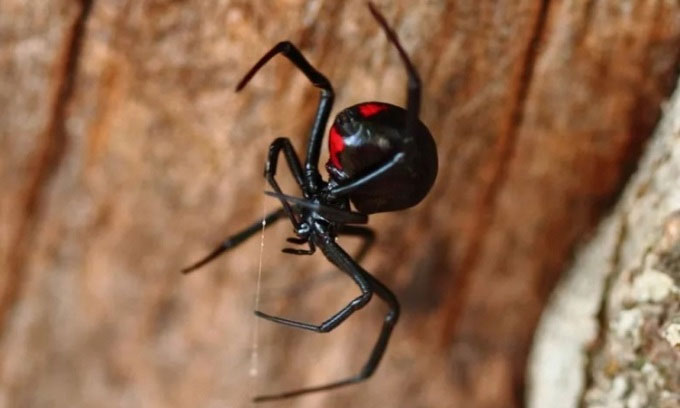The Southern California Alligator Lizard Eats Black Widow Spiders and Appears to Evolve Immunity to Their Venom.
Researchers in Nevada have taken a step closer to uncovering the secret behind the resistance to black widow spider venom. By studying the effects of the venom on various lizard species, which are natural predators of the black widow spider, they discovered that these lizards can withstand the lethal defense mechanisms of the spider.

The black widow spider is one of the most venomous spider species in North America. (Photo: Kadams66)
In California and other western states, the Southern Alligator Lizard (Elgaria coerulea) can easily consume black widow spiders. This phenomenon piqued the interest of Chris Feldman, a biology professor at the University of Nevada, Reno. Although the venom is harmless when ingested, it is likely that the lizards are bitten while hunting. Do they possess immunity to the venom?
In a study published on October 19 in the journal Royal Society Open Science, Feldman and his colleagues sought to answer this question through a series of experiments involving three lizard species and a small racetrack. The results indicated that over their long history of cohabitation with black widow spiders, Southern alligator lizards have evolved the ability to resist venom.
In the warm environment where black widow spiders thrive in the western United States, these lizards are their close neighbors. Black widow spiders even prey on small lizards that get caught in their webs. To investigate whether different lizard species have evolved protective mechanisms, graduate student Vicki Thill and her team brought Southern alligator lizards, Western fence lizards, and side-blotched lizards into the lab. There, they injected black widow spider venom into the lizards and let them run on the racetrack to see if the venom affected their speed.
Side-blotched lizards ran slower, indicating that the venom had an effect. However, despite being exposed to a dose of venom sufficient to kill five mice, both Southern alligator lizards and Western fence lizards showed no changes.
Next, the scientists examined muscle tissue in the lizards’ legs. In mammals, black widow spider venom destroys muscle cells, leaving widespread damage around the bite site. The Western fence lizards and side-blotched lizards showed signs of muscle injury and inflammation. However, in Southern alligator lizards, the muscle tissue remained completely intact as if they had never been exposed to the venom. This evidence suggests that Southern alligator lizards have evolved a rapid response mechanism to protect themselves from black widow spider venom. Feldman speculates that certain compounds may neutralize or dissolve the venom before it causes harm.

















































